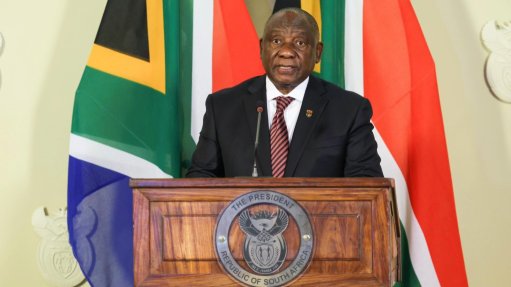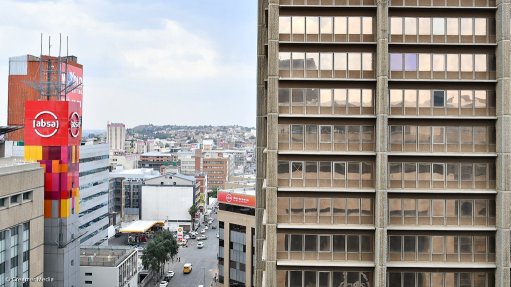Opinion: Gas-to-power a wrong turn in South Africa’s energy transition
In this opinion article, Dr Jonty Cogger and Paul Wani Lado, attorneys at the Centre for Environmental Rights, argue that the ‘gas cliff’ should not be used as a justification for building large-scale gas-to-power infrastructure without fully assessing the risks and cost implications.
South Africa is approaching what many call the “gas cliff”. By 2028, the country’s main supply of natural gas from Mozambique is expected to run out. This has triggered concern in government and industry circles, with calls for urgent investment in new gas infrastructure (pipelines, import terminals, regasification facilities and storage) to allow for the import of liquefied natural gas (LNG).
However, using the gas cliff as justification for building large-scale gas-to-power infrastructure without fully assessing the risks and cost implications is not the right solution for South Africa’s energy future. In fact, it risks locking the country into decades of dependence on another polluting, expensive, and unreliable energy source.
The push for gas-to-power is based on outdated assumptions. The National Planning Commission’s 2012 National Development Plan (NDP) once saw gas as a cleaner, viable replacement for coal. But since then, the global energy landscape has changed dramatically.
According to the 2022 Meridian Economics report, ‘Hot Air About Gas’, the cost of renewable energy has dropped so sharply that wind and solar are now generally cheaper than gas-fired power, although full value chain costs, including transmission, must be considered. In 2012, gas was 50% cheaper than renewables; moving forward a decade to 2021, gas was almost three times more expensive than wind or solar.
An updated value chain study that includes transmission costs is required, and it is possible that large-scale gas use for power generation may no longer be economically rational. If this is so, gas should, at most, potentially only play a small, flexible role as a backup for peak electricity demand, not as a mainstay of the energy mix.
According to analysis by Meridian Economics, forcing large-scale gas into the power system would increase electricity costs by at least 40% compared to a renewables-plus-peaking solution; while also exposing the country to volatile global gas prices, supply and currency risks.
Proponents of gas-to-power argue that the power sector can provide “anchor demand” to justify the huge investment in gas infrastructure. But independent modelling, including the ‘A Vital Ambition’ study by Meridian Economics and the Council for Scientific and Industrial Research, finds no evidence for this.
All credible scenarios show that South Africa’s power needs can be met with a combination of renewables, storage, and a small amount of flexible capacity but, crucially, without the need for large-scale gas.
Environmental and Climate Risks
Gas is still a fossil fuel. Methane, released during gas exploration, production, and use, is a potent greenhouse gas with 84 times the global warming potential of CO₂ over 20 years (IPCC AR5). Studies, including those by Howarth, highlight upstream methane leakage, making gas potentially as harmful as coal.
The ‘Hot Air About Gas’ report warns that building new gas infrastructure now would lock the country into high emissions for decades, just as the world is moving towards net zero. The risk of stranded assets (expensive infrastructure that becomes obsolete as the world shifts away from fossil fuels) is high.
Offshore gas exploration threatens coastal communities and ecosystems, while onshore gas activities and new pipelines pose socio-economic and health risks to inland communities. The ‘South Africa Oil & Gas Industry Outlook Q1 2025’ highlights mounting opposition from local communities and environmental groups, which has already delayed or halted several projects.
The Upstream Petroleum Resources Development Act and its draft regulations aim to accelerate oil and gas development, with limited attention to climate, socio-economic, or environmental justice. Civil society groups, including the Centre for Environmental Rights, Natural Justice, and groundWork, have warned that these rules could limit public participation and ignore the rights of affected communities. This is especially troubling for coastal communities who depend on healthy oceans for their livelihoods.
Investing in gas infrastructure would tie South Africa to volatile international markets. Gas prices are set globally and can spike due to events far beyond South Africa’s control, and would make local industries and households vulnerable to price shocks. The ‘Hot Air About Gas’ report also points out that most of the money spent on gas would leave the country, with little benefit for local jobs or industry.
A More Secure Path
In contrast, renewables are cheaper, faster to build, and can create more jobs per megawatt, though coal currently provides more employment overall. Greater local manufacturing and beneficiation in renewables are needed to match fossil fuel job numbers.
South Africa has some of the world’s best wind and solar resources. The ‘A Vital Ambition’ report and the South Africa Gas Pipeline Strategic Environmental Assessment (SEA) both show that a rapid build-out of renewables, supported by storage and grid upgrades, can meet growing electricity demand, reduce emissions, and create jobs. Renewables are less reliant on fuel imports, though components and minerals are often imported.
The main barriers to renewables are not technical or economic, but regulatory, political and infrastructural. Delays in grid connections, slow approval processes, and lack of support for storage and local manufacturing are holding back progress – the same alleged barriers to unlocking gas-totpower. Addressing these issues would allow South Africa to expand renewables more quickly and meet its energy needs without new fossil fuel investments.
South Africa faces a choice. It can use the looming gas shortage as an excuse to double down on fossil fuels, or it can take a bold step towards a cleaner, more secure energy future. The evidence is clear: investing in new gas-to-power infrastructure is a wrong turn. The right path is to accelerate the transition to renewables, support communities and workers through a just transition, and build an energy system that is clean, affordable, and resilient.
The decisions made today will shape South Africa’s economy and energy system for decades. Policymakers must be guided by facts, fairness, and the urgent need to shift away from fossil fuels. Instead of building new infrastructure for imported gas, South Africa should invest in renewables and grid upgrades, remove regulatory barriers, and ensure that affected communities have a real say in their future. This is the only way to achieve energy independence, economic growth, and environmental protection.
Article Enquiry
Email Article
Save Article
Feedback
To advertise email advertising@creamermedia.co.za or click here
Press Office
Announcements
What's On
Subscribe to improve your user experience...
Option 1 (equivalent of R125 a month):
Receive a weekly copy of Creamer Media's Engineering News & Mining Weekly magazine
(print copy for those in South Africa and e-magazine for those outside of South Africa)
Receive daily email newsletters
Access to full search results
Access archive of magazine back copies
Access to Projects in Progress
Access to ONE Research Report of your choice in PDF format
Option 2 (equivalent of R375 a month):
All benefits from Option 1
PLUS
Access to Creamer Media's Research Channel Africa for ALL Research Reports, in PDF format, on various industrial and mining sectors
including Electricity; Water; Energy Transition; Hydrogen; Roads, Rail and Ports; Coal; Gold; Platinum; Battery Metals; etc.
Already a subscriber?
Forgotten your password?
Receive weekly copy of Creamer Media's Engineering News & Mining Weekly magazine (print copy for those in South Africa and e-magazine for those outside of South Africa)
➕
Recieve daily email newsletters
➕
Access to full search results
➕
Access archive of magazine back copies
➕
Access to Projects in Progress
➕
Access to ONE Research Report of your choice in PDF format
RESEARCH CHANNEL AFRICA
R4500 (equivalent of R375 a month)
SUBSCRIBEAll benefits from Option 1
➕
Access to Creamer Media's Research Channel Africa for ALL Research Reports on various industrial and mining sectors, in PDF format, including on:
Electricity
➕
Water
➕
Energy Transition
➕
Hydrogen
➕
Roads, Rail and Ports
➕
Coal
➕
Gold
➕
Platinum
➕
Battery Metals
➕
etc.
Receive all benefits from Option 1 or Option 2 delivered to numerous people at your company
➕
Multiple User names and Passwords for simultaneous log-ins
➕
Intranet integration access to all in your organisation





















